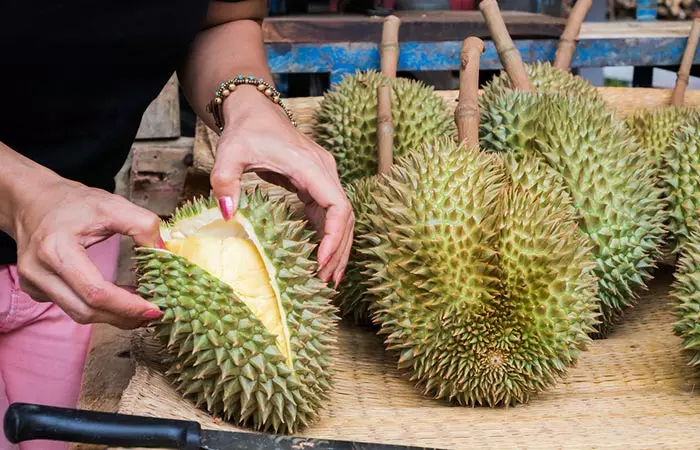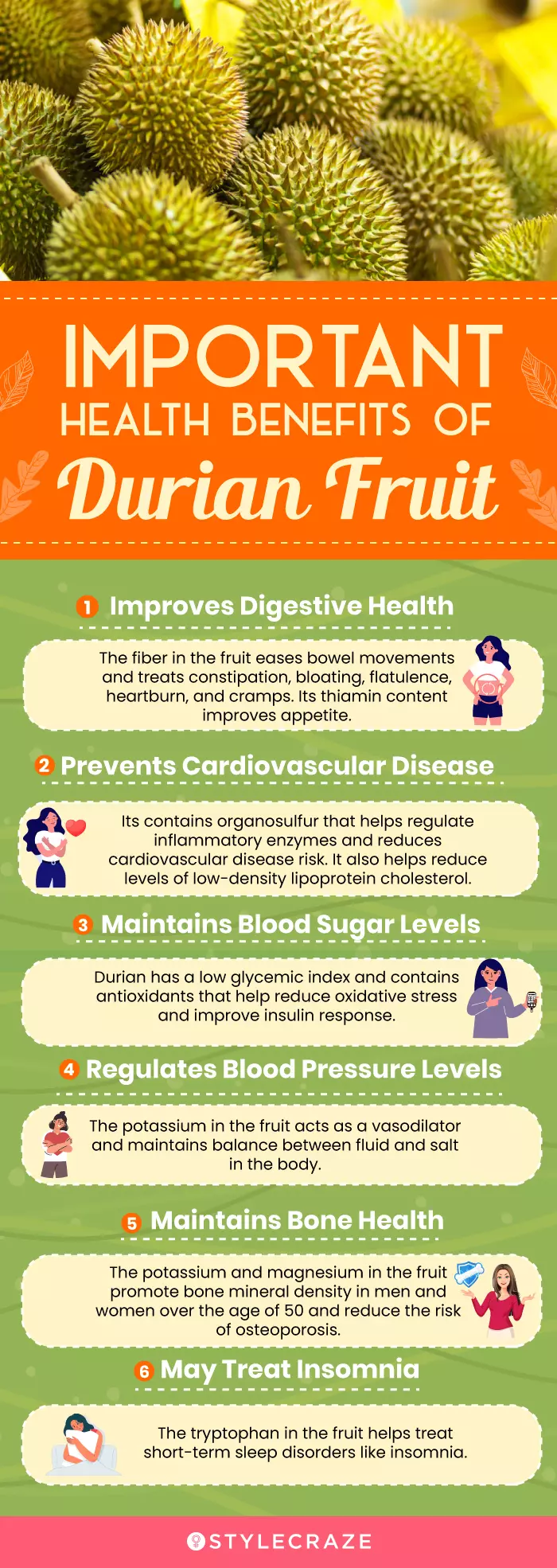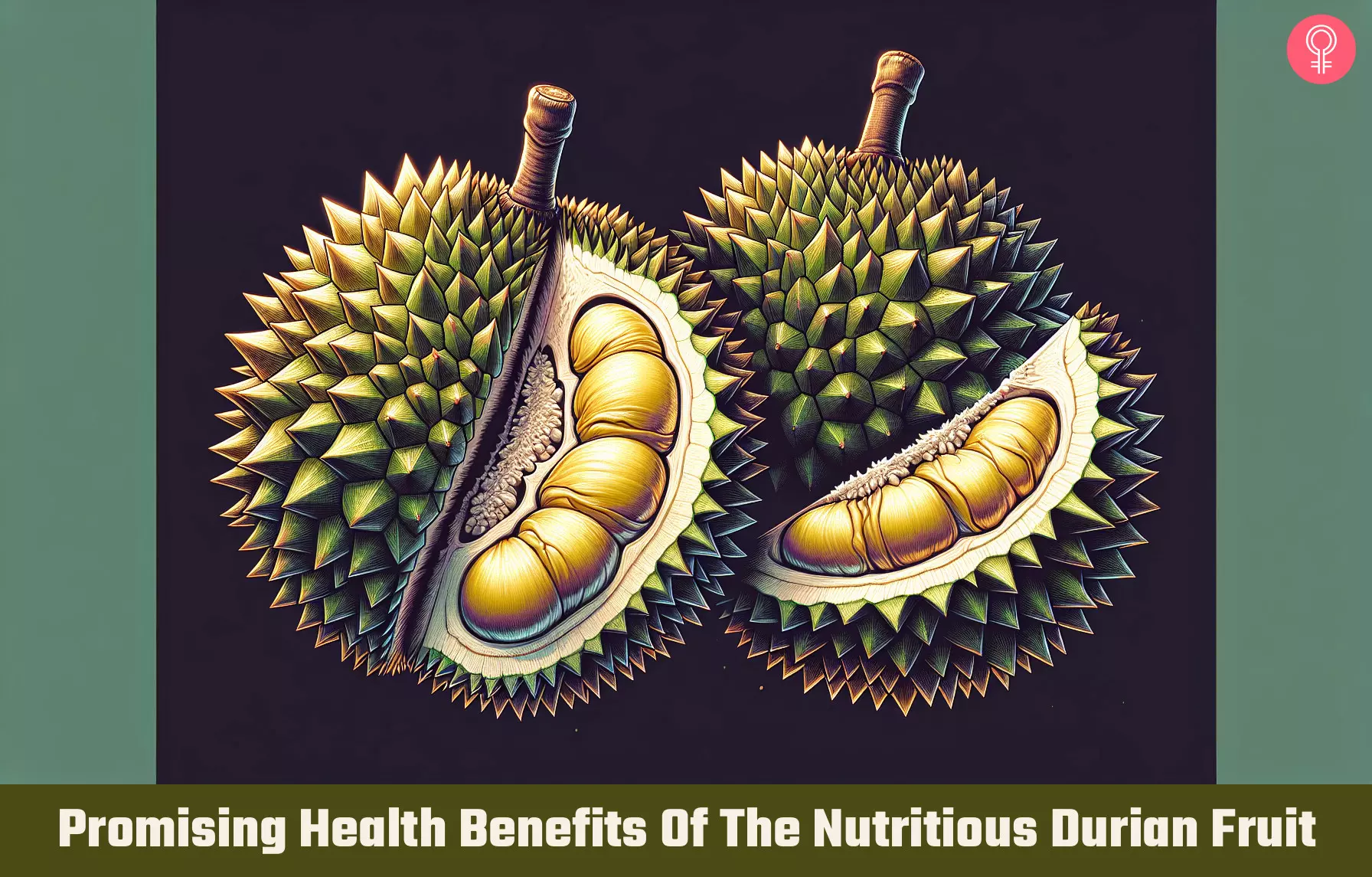Durian may help alleviate digestive disorders, high blood pressure, diabetes, and cardiovascular diseases. This article discusses the benefits of durian fruit, its nutritional profile, and any potential side effects. Keep reading.
What Is The Durian Fruit?
The durian fruit is large (up to one foot long) in size with a spiky and hard custardy flesh-like exterior. It contains large seeds. This king of fruits is available in several varieties, and the most common variety is the Durio zibethinus. What Are Its Benefits? It improves cardiovascular and digestive health, regulates blood sugar levels, and prevents skin aging. Who Can Consume It? All except those who are pregnant or breastfeeding. How Often? Two to three servings a day. Caution It could lead to nausea or cause heart palpitations if consumed with alcohol.
Lisa Andrews, M.Ed, RD, LD, says, “Both the seeds and flesh of durian fruit are edible, but the seeds need to be cooked first. Durian is a good source of antioxidants, which may help reduce the risk of cancer. Unlike other fruits, durian contains carbohydrates, fats, proteins, vitamins, minerals, fiber, and antioxidants. The fiber and antioxidants in durian may also aid in reducing the risk of heart disease.” She continues, “Durian fruit doesn’t taste like traditional tropical fruit (AKA pineapple) where it’s straight-up sweet. Durian tastes similar to a bland vanilla custard with a hint of cheese and almonds. The smell of durian fruit can be strong and off-putting, but most people find the taste interesting and enjoyable.” A single durian weighs nearly 602 grams and is a good source of energy. A 100 grams of this fruit renders about 147 Kcal of energy, which is about 7% of the recommended dietary allowance (RDA). This edible fruit is very smelly due to the presence of volatile sulfur compounds and fatty acids. A study conducted by the German Research Center for Food Chemistry states that durian has 44 odor active compounds, and its potent smell is a combination of honey, fruit, sulfur, and roasted and rotting onions, which some may find pungent (1). Lisa adds, “Durian can be used in either sweet or savory dishes such as desserts, and soup, or made into sauces or side dishes. It’s commonly used in Southeast Asia cuisine, where it is grown.” A blogger tried durian fruit and described his experience: “When I first bit into its soft, custard-like flesh, I [was] met with a rush of flavors. The durian has a sweet and savory taste that can be likened to a creamy almond sweetness combined with a mild onion-like savoriness (i).” Apart from Durio zibethinus, learn about the other varieties of the durian fruit in the next section.
Different Types Of Durian Fruit
Sultan Durian: It has a sweet and slightly bitter taste and is the most popular variety in Singapore. It is also known as Bukit Merah. Monthong Durian: It has a rich, sweet flavor similar to a blend of vanilla, pepper, and caramel. It is commonly found in Thailand. Black Thorn Durian: It has a sweet, creamy flavor with a hint of bitterness. It comes from the Malaysian state of Penang. Green Durian: It has a bitter, musky taste with a hint of sweetness. It is popular in Indonesia.
Apart from these, there are several other durian varieties like red prawn and kan yao. Each of them has a distinct taste, making durian a fascinating fruit for those who prefer unique flavors. While many are drawn to durian for its rich flavor and health benefits, its notoriously strong smell leaves others less enthusiastic. This polarizing nature has earned durian its reputation as the ultimate love-it-or-hate-it fruit. Check out the nutritional information of this fruit below.
Nutrition Facts Of Durian Fruit
The durian fruit has an impressive nutrition profile. According to the United States Department of Agriculture, 100 g of durian consists of (2):
Energy – 147 kcal Protein – 1.47 g Carbohydrate – 27.09 g Fiber – 3.8 g Calcium – 6 mg Potassium – 436 mg Vitamin C – 19.7 mg Riboflavin – 0.2 mg Folate – 36 micro g
It contains vitamins B6 and A, niacin, and plant compounds, such as flavonoids, carotenoids, anthocyanins, and polyphenols. Durian also contains essential minerals, such as iron, calcium, phosphorus, and zinc. However, durian has high calories compared to other fruits. Lisa says, “ It also contains more fat and protein than traditional fruit. One cup of chopped, raw durian fruit has nearly 360 calories, 66 grams of carbohydrates, 13 grams of fat, and 4 grams of protein. In addition, durian is a good source of vitamin C, potassium, manganese, copper, and B vitamins including thiamin, niacin, riboflavin, folate, and vitamin B 6. Foods that contain at least 10% of the Daily Value for a nutrient may be labeled “a good source” of that nutrient.” In the following section, we will take a look at the health benefits of the durian fruit.
What Are The Benefits Of Eating Durian Fruit?
1. May Improve Digestive Health
The dietary fiber in durian helps in easing bowel movement. This, in turn, helps prevent constipation and improves digestive health (3). The thiamin in the fruit may improve appetite and general well-being in the elderly (4). The fiber in durian fruit also stimulates peristaltic motion. It may ease the digestive process in the intestines. It also helps treat issues like bloating, excess flatulence, heartburn, and cramps (5).
2. May Help Prevent Cardiovascular Diseases
The organosulfur in durians may regulate the inflammatory enzymes and reduce the risk of cardiovascular diseases (6). A study conducted by the Tulane University School of Public Health and Tropical Medicine found that intake of fruits that are rich in soluble dietary fiber may help lower the levels of low-density lipoprotein cholesterol (LDL-C) and reduce the risk of coronary heart disease (7). Durian fruit is a heart-friendly food with a high fiber content (3).
3. May Help Maintain Blood Sugar Levels
The manganese in durian may help in the maintenance of blood sugar levels. In one study, the intake of durian had also improved the insulin response curve in 10 patients with diabetes. The antioxidants in durian also help reduce oxidative stress, which can otherwise aggravate diabetes symptoms (8). Durian also has a lower glycemic index (GI) (9). Hence, the fruit would not lead to blood sugar spikes.
4. May Help Regulate Blood Pressure Levels
Durian is a good source of potassium (10). Research shows that increasing potassium intake can lower blood pressure levels (11). The potassium in the fruit also works as a vasodilator. It can help maintain the balance between fluid and salt in the body’s cells (12), (13). The mineral may help reduce stress on the blood vessels and decrease the risk of heart attack or stroke (14).
5. May Help Delay Aging
Durian is rich in vitamin C and high in nutrients that are powerful antioxidants that reduce oxidative stress caused by free radicals (10). The lower the oxidative stress levels, the slower the aging process. Durian is rich in other antioxidants as well (15). Studies show that antioxidants can help reduce some signs of skin aging (16). The consumption of durian may reduce the signs of premature aging, including fine lines, wrinkles, or age spots. However, direct research is lacking in this aspect.
6. May Reduce Cancer Risk
Durians are said to possess antioxidant properties that may help reduce cancer risk. The fruit contains polyphenols that inhibit cancer growth and even kill cancer cells. In one study, the fruit showed protective effects against breast cancer cell lines (17). Free radicals are known to destroy healthy cells and cause the spread of cancer. Since the antioxidants of durians fight free radicals, they may also help in lowering cancer risk. However, more direct research in this regard is warranted.
7. May Help Treat Sexual Dysfunction
Durian pulp is believed to possess aphrodisiac properties (3). However, there are no studies to validate these claims. Though durian is traditionally used to boost fertility, its effectiveness is yet to be studied (18).
8. Helps Maintain Bone Health
Durians are rich in potassium and magnesium. These two minerals contribute to bone health. Studies show that a high potassium intake can promote bone mineral density in men and women over the age of 50 years (19). Research also shows that magnesium deficiency can increase the risk of osteoporosis (20). However, more direct research is needed to substantiate the efficacy of durians in promoting bone health.
9. May Treat Anemia
Durian is a rich source of folate (21). Studies link folate deficiency to hemolytic (related to the rupture of red blood cells) anemia (22). Folate, if not present in adequate quantities, could lower the number of red blood cells produced. This, in turn, can trigger anemia. Other minerals in durian may trigger the production of red blood cells (RBC). However, more research is warranted in this regard.
10. May Treat Insomnia
Eating durian fruit may treat insomnia. Durian contains tryptophan (an essential amino acid) (23). Studies show that tryptophan may help treat short-term sleep disorders (24).
11. May Act As A Natural Anti-Depressant
It is believed that durian can help relieve the symptoms of depression, anxiety, and stress (3). Durian may help in the production of serotonin, though there is no research yet to support this. Studies show that low levels of serotonin can aggravate depression (25). After reading about these promising benefits of durian fruit, you must be wondering how to eat it. Check out the next section to know more.
How To Eat Durian Fruit
Cutting a musky durian fruit can be a bit challenging. Its spiky shell requires one to wear gloves. However, the process is simple.
Make a cut on the top of the durian fruit with a knife. Pull the skin apart and remove the flesh from within. Cut open the other sections as well. The creamy flesh of the durian is also sold, frozen separately.
Selecting A Ripe Durian If you want to pick the perfect durian, there are some key signs of ripeness you should be aware of.
First, take a whiff of the fruit. The stronger the aroma, the riper the fruit. Give the shell a light press. It should have just a bit of give, but the spikes should still feel firm and intact, not too brittle.
Though durian benefits your health in many ways and is generally considered safe for consumption, it has caused certain side effects in some individuals. Check them out in the next section.
What Are The Side Effects Of Eating Durian?
Limited research is available on the side effects of durian. Some anecdotal evidence suggests that durian may cause gas, diarrhea, stomach upset, vomiting, and allergic reactions in some people. The consumption of durian seeds may cause shortness of breath. However, these are yet to be validated by concrete research.
May Aggravate Diabetes
This is highly unlikely, given the low glycemic index of durians. However, anecdotal evidence suggests that excess intake of durians in a short period may spike blood sugar levels. If you have diabetes, limit your durian intake.
May Cause Problems During Pregnancy
Not enough scientific data is available about the safety of durian consumption during pregnancy or lactation. Hence, stay safe and avoid use. Consult your doctor. Eating durian along with alcohol is thought to lead to death (3). Some compounds in the durian fruit may stop certain enzymes from breaking down alcohol. However, evidence is lacking in this regard. How should durian fruit be stored and how long does it last? Lisa suggests storing durians on the bottom shelf of the refrigerator, away from other foods. She explains,“ Because of its stinky smell, it could permeate other foods. Once durian is cut, it should be tightly wrapped and stored in the refrigerator. Durian will last for about 5 days after it’s been cut. Durian fruit can also be stored in the freezer once cut. It must be wrapped very tightly and will last a few months. This helps prevent it from getting freezer burn or having the smell take over other food in the freezer.” Can I drink water after eating durians? You may drink plenty of water after eating durians. Can I drink lemon water after eating durians? Yes. Lemon water also promotes digestive health. You can have it after taking durians. What can you not mix with durian? Mixing durian with alcohol, mangosteen, lychee, milk, mutton, beef, or crabs may cause harm. However, this information is based on anecdotal evidence only. Is durian a superfood? Yes, durian qualifies as a superfood due to its outstanding nutritional profile and health benefits (2). Where is durian banned? Durian has been outlawed on various types of public transportation in Singapore, Thailand, Japan, and Hong Kong due to its strong odor. Is durian good for the kidney? Durians have a high potassium content. Although potassium supports heart health and breathing, those with chronic kidney disease should be cautious. When the kidneys fail, the body’s ability to eliminate excess potassium is compromised. This leads to the accumulation of excess potassium in the body. Hyperkalemia, or excessive potassium levels in the blood, is common in those with severe CKD (26).
Illustration: Promising Health Benefits Of The Nutritious Durian Fruit
Learn about the amazing health benefits and uses of durian fruit! Click on the video to discover its unique flavor, how it can be used in cooking, and more.













